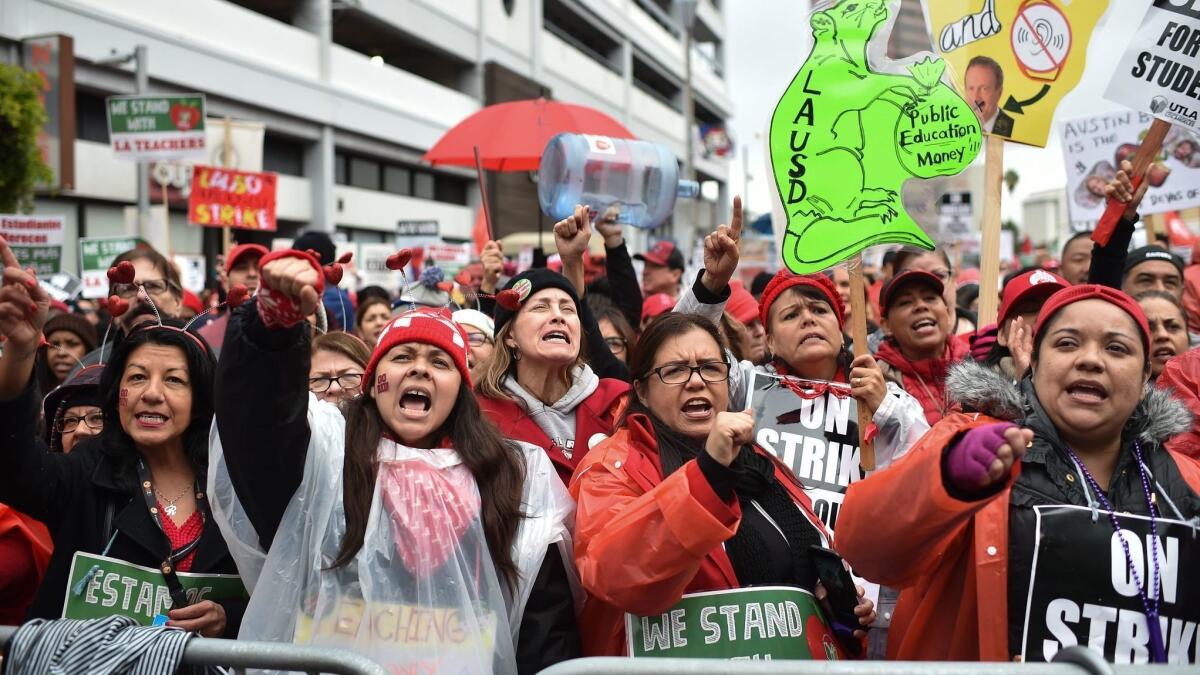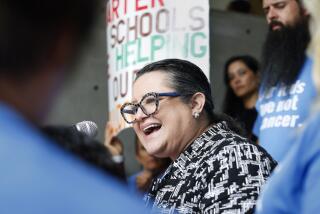L.A. charter schools’ plans: Take back mayor’s office, sue district, battle teachers union

In the wake of the Los Angeles teachers strike, a group of key charter school supporters, concerned about political backlash, worked on a plan to stem anti-charter sentiment and regain control of local education reforms.
The strategy under discussion was to “take back” the Board of Education and the mayor’s office, develop a lawsuit against the school district and attack the local teachers union, United Teachers Los Angeles.
These goals are laid out in a March email from education activist Ben Austin to an inner circle of charter backers. The email attempts to summarize their joint discussions to date and their agenda going forward.
Contacted early Tuesday morning, Austin declined to comment, and several recipients of the email have distanced themselves from the views expressed.
The Times has reviewed the document and others shared among advocates and charter supporters. The documents were obtained by the site michaelkohlhaas.org. The confidential memo, sent after the six-day January teachers strike, seems to provide a window into the state of mind and strategies of charter supporters.
The goal of taking back the mayor’s office is a reference to current Mayor Eric Garcetti. The mayor has portrayed himself as a centrist on local education matters — able to work with all sides to advance the common cause of helping students. Austin’s memo suggests that people on his side see the mayor as not tilting appropriately in their direction.
Garcetti, who has been elected twice, is not eligible for a third term.
How strategizing evolved after the memo is not clear, nor is the follow-up of the various individuals who received the email.
“We never endorsed or worked on any of the ideas that were sent in that memo,” said Seth Litt, executive director of Parent Revolution.
“Our organization did not agree with or endorse many of the ideas or the language discussed in this email,” said Katie Braude, chief executive of Speak Up, which recruits parents and publishes an online newsletter.
The email also went to Marshall Tuck, who ran a close second to a teachers union-backed candidate in the race in November for state superintendent of public instruction.
Tuck said he wasn’t involved in developing the memo and did not attend a meeting with the group in advance of the memo. He added that some of the language used “is more divisive than anything I believe.”
The overriding issue of the email is how to overcome setbacks at the hands of the teachers union. Leaders of the union had vilified charters in the lead-up to the strike, saying that rapid charter growth was undermining traditional public schools by siphoning away motivated students and their families — and the public funding that travels with them. One day during the walkout was devoted to a march on the local headquarters of the California Charter Schools Assn.
Meanwhile, at the state level, charter supporters had spent big on losing candidates in the 2018 race for governor as well as Tuck’s bid for state superintendent. A central concern was that the growth of charters would be halted or even reversed.
Austin asserted in his email: “As Machiavelli says, it’s better to be feared than loved. Right now we are neither.”
RELATED: Read the memo sent to charter school leaders »
Charter schools are privately operated and exempt from some rules that govern district-run schools. Most are nonunion, which partly explains union opposition.
The growth of charters has been fueled by philanthropists and foundations from around the country. And they’ve proved popular with many families, enrolling nearly 1 in 5 district students.
The email’s recipients included officials with the California Charter Schools Assn., two local charter school groups — STEM Preparatory Schools and Green Dot Public Schools — and advocacy organizations with substantial funding from charter supporters.
Austin reiterates what he said the group has settled on as its core principal that it — not the unions — is fighting for students.
As described in the email, the inner circle’s long-term goal — with a deadline of 2030 — is to achieve “a quality public education for every student in the LAUSD, agnostic to school model, measured by child outcomes.”
Austin notes that the 2030 date is “obviously random” and that the date was further out “than it took for America to figure out how to land on the moon.” But the time frame seemed correct, he says, because “it feels far enough away that it forces us to think long-term ... but soon enough that it’s urgent, non-theoretical, and will directly impact the children in the system today.”
The nearer-term goals are to “retake” a controlling majority on the L.A. Board of Education in 2020, defend quality charters and establish legal rights for parents and students.
The memo then goes into greater detail, noting an additional imperative to “take back” the mayor’s office.
Garcetti played a key role in mediating an end to the teachers’ strike but has largely avoided the day-to-day politics of L.A. Unified. Austin’s summary implies that a plurality of this group’s members would prefer someone like Garcetti’s predecessor, Antonio Villaraigosa, who used his political muscle on behalf of charters and their allies — and also favored such measures as using test scores to evaluate schools and teachers.
“The 2020 school board races represent a critical opportunity to recapture our reform board majority,” writes Austin, summarizing the position of the group. “The 2022 mayoral race represents an opportunity to take back the mayor’s office and recapture our ability to drive a citywide agenda from the top-down.”
L.A. school board races have become the most expensive in the country, typically pitting candidates backed by the teachers union against those supported by charter enthusiasts.
The memo also talks of a legal strategy to establish students as a “legally protected class” entitled to newly enforceable “civil rights.” Austin suggests that this strategy would allow the pursuit of litigation that would mandate reforms he and his allies favor.
One idea he lays out on behalf of the group is a school-turnaround model that would put every educational institution on a five-year contract. Those that fall short could be restaffed or converted into charters.
Austin noted that the group also wants to weigh the idea of allowing noncitizens to vote in school board elections, though he acknowledges that such a process would not necessarily do much to “defend charters.”
The last stated goal is: “Attack UTLA.”
“Our goal isn’t to ‘beat’ UTLA,” Austin writes. “It’s to transform a system for kids. But we do need to deal with the fact that they are trying to beat and eliminate us.”
Several people who received the email said that during the period in question their focus turned quickly toward supporting Measure EE, a property tax that would have benefited all local public schools. The measure failed and support for it among this group’s reform allies was mixed.
Even Austin’s household was divided. He supported Measure EE. His wife, fundraising consultant Tracy Austin, worked to defeat it on behalf of the “no” campaign, billing close to $100,000 for her work.
More to Read
Start your day right
Sign up for Essential California for news, features and recommendations from the L.A. Times and beyond in your inbox six days a week.
You may occasionally receive promotional content from the Los Angeles Times.






